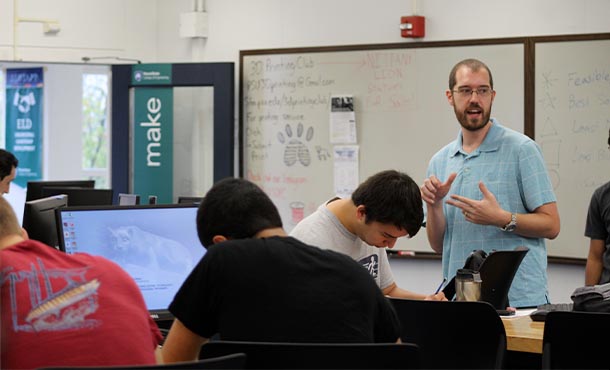
Nicholas Meisel, assistant professor of engineering design, will use his National Science Foundation Faculty Early Career Development award to define boundaries engineering designers may unintentionally place on themselves and their projects and how to transform design thinking to better align with additive manufacturing. IMAGE: PENN STATE
Adding layers to improve design ideation
Engineering design researcher receives NSF CAREER award to investigate how to infuse design for additive manufacturing concepts and guidelines into early-stage design
7/9/2021
By Samantha Chavanic
UNIVERSITY PARK, Pa. — When engineers design a product using traditional manufacturing processes, it is commonplace for them to alter or adjust concepts and visions to transform the design into reality. According to Nicholas Meisel, assistant professor of engineering design, these steps aren’t necessary when using additive manufacturing because of the project freedom allowed by 3D printing and its layer-by-layer design capabilities.
Though more flexible than conventional manufacturing design capabilities, design for additive manufacturing design (DfAM) may be limited by design decisions based on traditional manufacturing restrictions. Meisel aims to change this with his recent $585,000 National Science Foundation Faculty Early Career Development (CAREER) award. Meisel will work to define what boundaries engineering designers might unintentionally place on themselves and their projects and how to transform thinking to better align with the innovative possibilities afforded by additive manufacturing.
“Our manufacturing processes are much more powerful when it comes to creating exactly what we envision,” he said. “This [layer-by-layer process] enables what is commonly referred to as ‘free complexity,’ where we can essentially manufacture any geometry, no matter how complex, without incurring additional processing costs. This allows us to create parts based on powerful design concepts such as topology optimization, cellular mesostructures and mass customization.”
Currently, most DfAM research focuses on improving later design stages. It investigates already existing design concepts and geometry and how to modify them for AM — restricting research and approaches to work within the confines of these designs and geometric concepts.
“There’s only so much that changes made in the later stages of the design process will be able to accomplish,” he said. “This is why early-stage DfAM is so important. It allows us to address designers’ preconceptions early on so that DfAM can have a more significant effect on their designs.”
In the initial phase of the project, Meisel will present Penn State engineering students and engineering professionals with design challenges, gathering data on the quality of the participants' solutions based on concept usefulness, originality, and the likelihood of manufacturing success. The data will help create a framework that identifies early-stage design manufacturing features that need to be reevaluated for DfAM. These designs will also be used to discover how best and when to present DfAM standards, leading to a full integration of DfAM guidelines into the design process — ultimately improving an engineer’s design capabilities.
“If engineers keep designing the same old designs based on traditional manufacturing technology, then the innovative potential of our products is going to stagnate due to an adherence to outdated manufacturing limitations,” Meisel said.
The project will also expand the teaching and use of additive manufacturing across educational levels through targeted efforts for K-12, undergraduate and graduate students.
Based on a project from his graduate students, Meisel will guide the creation of curriculum and training for K-12 use of “maker carts” — self-contained, movable carts complete with an extrusion printer, computer, 3D scanner, 3D-printing pens and sample prints.
“Rather than being limited to a single static location, the printing system can be moved to wherever the students happen to be,” he said. “With this sort of access, they can explore the technology and develop an intuition for some of the unique design opportunities and challenges that it presents.”
Meisel will host a two-day make-a-thon design challenge, in partnership with the Humanitarian Engineering and Social Entrepreneurship program and Penn State Maker Commons, for undergraduate students. At the graduate level, Meisel aims to improve an existing, mixed-mode DfAM course by offering a new project focused on novel DfAM support tools.
Meisel stressed the importance of engaging students in additive manufacturing and its capabilities through initiatives like these. He views early introduction to DfAM as a critical component needed to advance the additive manufacturing educational and workforce pipelines.
“By introducing students to DfAM early in their engineering careers, we will be able to help mold their design thinking before they establish too many mental barriers around what is possible and impossible when it comes to manufacturing,” he said. “If we can use this to help change the way that the next generation of engineers conceptualizes design for manufacturing, then this should hopefully lead them to more naturally account for the innovative potential of AM in their design concepts.”



